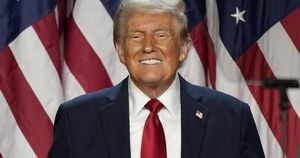Germany stands at the precipice of political upheaval as its government faces the prospect of collapse. The current coalition, which is led by Chancellor Olaf Scholz, has been under immense pressure as internal coalition divisions widen, fueled by dissatisfaction within the ranks of the Social Democratic Party (SPD) and its partners, the Greens and Free Democrats (FDP). The SPD is drawing increasing scrutiny for its handling of the economy and public sentiment, as Germany’s economic performance continues to lag behind its European neighbors.
Market analysts have begun speculating about potential scenarios if the government does fall, particularly noting how it might impact fiscal policy and investment strategies across Europe. Specifically, many are betting on the idea of looser fiscal policy post-election, which could be welcomed by investors eyeing higher growth potential for the beleaguered German economy.
On November 10, 2024, pressure escalated sharply with reports pointing to divisions among the coalition partners over key economic policies. The SPD's leadership faces challenges from both within and outside the party, with increasing calls from opposition factions for new elections. Observers think the failure to present concrete economic reforms could leave the ruling coalition vulnerable to collapse as early as February 2025.
Despite the instability, some analysts note potential silver linings amid the chaos. If the SPD manages to reform its fiscal strategies, it could lead to stronger investment returns and stimulate growth momentum across the European market. The paradox here is palpable; the very uncertainty created by collapse could spur positive changes if the right leadership emerges. According to market reports, loosening fiscal policies may provide much-needed boosts to European stocks and stabilize the euro, as investors rush to capitalize on perceived opportunities amid the uncertainty.
The structural challenges facing Germany are exemplified by the so-called "debt brake," which limits government borrowing. This fiscal rule, established to maintain budget discipline, could be modified following new elections if the coalition fractures. Fiscal experts suggest the debt brake’s rigid structure has hindered the government’s ability to respond effectively to economic downturns, and altering this could increase public spending and investment, thereby propping up economic performance.
Adding to the complexity of the situation, the new finance minister has signaled no intention of freezing the 2024 budget—a move some had anticipated amid the recent coalition difficulties. Maria Martinez, the new finance minister, emphasized during her inaugural address on November 12, 2024, the government's commitment to meeting its obligations, stating, "We will pay all our obligations, and no budget freeze is on the table." This commitment could soothe investor fears, but skepticism remains about the government's capacity to fulfill economic promises.
Current economic indicators show mixed results for Germany. Recent figures released by Germany’s Ministry of Economy suggest the nation has narrowly avoided recession for the third quarter of 2024, with growth of 0.2%. Yet, forecasters remain wary about continued slow growth as inflation and rising energy costs loom large over consumer sentiment. Many households are also grappling with stagnant incomes, leading to decreased spending capacity, which is detrimental to domestic consumption—a key driver of Germany's economic engine.
All the eyes are on the upcoming elections proposed to be held on February 23, 2025. Interestingly, recent surveys reveal voters are more concerned about economic recovery than ever before. This sentiment may manifest itself at the ballot box, potentially impacting traditional voting patterns. Should traditional voters of the SPD turn toward new candidates promising revitalization and bold fiscal reforms, it could signal the end for the current coalition.
Industry insiders are already sounding alarms. The collapse of the government could lead to significant uncertainty for businesses, particularly those reliant on stable fiscal policies. Some economists point out this could trigger significant capital flight from Germany, especially if firms doubt their ability to thrive amid bureaucratic instability. Companies may begin making contingency plans to relocate key operations to more stable European nations. This could also open the market for cheaper labor investments outside of Germany, with possibilities of moving operations to Eastern European countries, where labor costs remain significantly lower.
Despite the disarray, there are predictions of optimism adopting potential reforms. A guiding coalition could emerge from the rubble, one interested not only in maintaining Germany’s economic prosperity but also enhancing its international standing. Analysts are already pointing to the necessity of establishing clearer communication channels between the government and businesses to navigate this uncertain period.
For many observers, much hinges on Chancellor Scholz’s ability to unify his coalition and present actionable policies to the electorate. Merkel's tenure taught everyone the importance of coalition governance, and should Scholz muster the resolve to initiate reforms, it is possible the coalition might stabilize. On the flip side, another failure to address public concerns could lead to even greater political realignment within Germany.
Overall, the path forward for Germany remains fraught with uncertainty. The intersection of politics and economics creates an unpredictable environment, with potential ripple effects felt across Europe. Investors are bracing for possible volatility as the events unfurl and people are starting to wonder—will this political upheaval create the necessary impetus for economic rejuvenation, or will it plunge Germany back toward recession?
With discussions about the future entrenched deeply within the public and private sectors, all eyes will remain fixed on Germany's political developments as the nation holds its breath to see which way the political winds will blow and what it means for the future of the economy.



